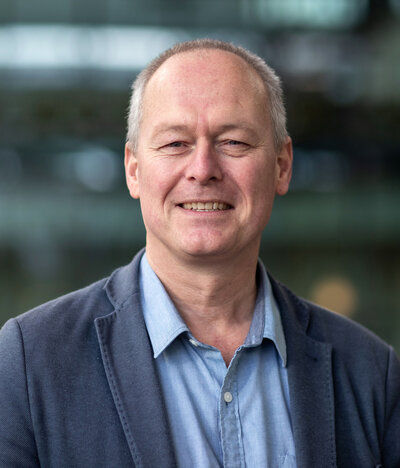John van der Schaaf
Department / Institute
Group

RESEARCH PROFILE
The research of John van der Schaaf focuses on the development of catalytic and non-catalytic multiphase reactors that use rotation to create high gravity and high shear conditions. These conditions lead to excellent interphase mass transfer, intraphase mixing, and fluid-to-wall heat transfer. Applications are especially in (exothermic) fast reactions that are interphase mass transfer limited, are mixing limited, or are heat transfer limited. Additionally, in a high gravity field two phases with different density can be contacted countercurrently. Thus, distillation (gas-liquid), extraction (liquid-liquid), and crystallization (liquid-solid) become feasible.
The high-gravity high-shear conditions enable the use of extremely compact equipment for the chemical industry. The equipment is easily a factor hundred smaller than conventional equipment. The much smaller equipment size allows for the safe use of high temperatures and high pressures, enlarging the economic process window. An additional benefit of the small equipment size is that expensive construction materials and coatings can be used, with only a minor increase in equipment costs.
In future research Van der Schaaf will focus on the performance of high-gravity high-shear equipment as a function of design, operating conditions, and fluid properties. For proper design and optimization, preferably determined with industrially relevant systems, research is required into e.g. flow patterns, mixing intensity, and interphase mass transfer.
The switch to renewable resources requires a new generation of chemical production plants. I develop small, multipurpose and durable production units enabling a self-sustainable chemical community that provides for local welfare and wellbeing.
ACADEMIC BACKGROUND
John van der Schaaf studied chemical engineering at TU Delft where he obtained his master's degree in 1993. In 1998 he obtained his PhD from the same university with his thesis 'Dynamics of Gas-Solids Fluidized Beds - analysis of pressure fluctuations'. Until 2000 he performed postdoctoral research at TU Delft on the validation of computational fluid dynamics codes for gas-solid fluidized beds. In 2000 he moved to Eindhoven University of Technology (TU/e) where he joined the Glass Technology research group of Prof. Ruud Beerkens to perform postdoctoral research on the formation of foam in glass melting furnaces, in cooperation with TNO. In 2003 he started working as assistant professor (tenure track) in the Chemical Reactor Engineering group of Prof. Jaap Schouten. In 2014 he was appointed associate professor and since 2017 he is the chair of the group.
Recent Publications
-
Stéphane J.C. Weusten,John van der Schaaf,Matheus T. de Groot
The effect of inlet design and developing flow on local mass transfer in electrolyzers
International Journal of Electrochemical Science (2023) -
Akmal Irfan Majid,Yali Tang,Giulia Finotello,John van der Schaaf,Niels G. Deen
Systems and methods for continuous electrolytic production of metals
(2023) -
Akmal Irfan Majid,Giulia Finotello,John van der Schaaf,Niels G. Deen,Yali Tang
Comparative study of electroreduction of iron oxide using acidic and alkaline electrolytes for sustainable iron production
Electrochimica Acta (2023) -
Akmal Irfan Majid,Yali Tang,Giulia Finotello,John van der Schaaf,Niels G. Deen
Unraveling Prospects and Challenges of Using Electrolytic Iron Powder For CO2-Free Circular Fuel
(2023) -
Akmal Irfan Majid,Yali Tang,Giulia Finotello,John van der Schaaf,Niels G. Deen
Dendritic Iron Formation in Low-Temperature Iron Oxide Electroreduction Process using Alkaline Solution
(2023)
Current Educational Activities
- Advanced chemical reactor engineering
- Energy
- International research/design work placement
- Capita selecta
- Chemical reactors
- Practical introduction course to chemistry and chemical technology
- Reactor Design
- Chemical Reactor Engineering
- Biochemistry and Technology
- Design project
- Chemical Reactors
- Preparation for the graduation project HySET track
Ancillary Activities
- Redactioneel lid, NPT Procestechnologie